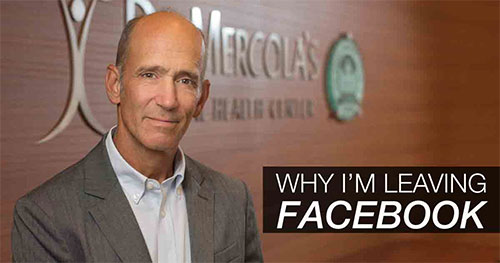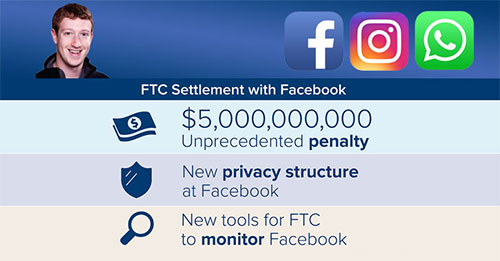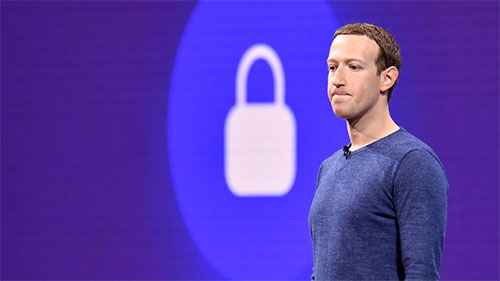Mercola.com Left Facebook
• As of August 13, 2019, Mercola.com no longer maintained an active Facebook page. The page remained, but no further posts were made.
• Earlier in 2019 Dr. Mercola issued a poll to see how followers would feel about him leaving Facebook. The results arrived in late March, 2019, with just over 65% agreeing with his decision to withdraw from the platform.

• July 24, 2019, the U.S. Federal Trade Commission announced Facebook will pay a $5 billion fine to settle some of the known privacy breaches, including that of Cambridge Analytica.
• Corporate changes are also required under the FTC order. As CEO, Zuckerberg will be required to provide the FTC with a quarterly statement guaranteeing Facebook’s privacy program complies with the order, and “a false certification could trigger civil or even criminal penalties”.
• $5 billion is only one month’s worth of revenue for Facebook, and its planned integration of Instagram, Messenger and WhatsApp will turn it into a global super-monopoly with unprecedented data mining capabilities.
As you probably know, Facebook has promised to combat “fake news” on its platform, but its censorship doesn’t end at blatantly fake news articles – far from it. Information that is unfavorable to Facebook (or its advertisers) keeps getting censored out as well.
One example was the censoring of U.S. presidential candidate Sen. Elizabeth Warren. Warren is an outspoken proponent of breaking up monopolies such as Amazon, Facebook and Google, and has vowed to introduce “sweeping new regulation of Silicon Valley,” should she be elected president.
Three of Warren’s ads were reportedly removed by Facebook in March 2019, with a message saying the ads were deleted because they went “against Facebook’s advertising policies.” Warren took to Twitter to comment on the removal, saying this is an example of why her proposal is so sorely needed.
Facebook is also “hiding” content that is critical of vaccines, and has barred “ads that contain misinformation about vaccines.” It’s likely only a matter of time before the platform starts censoring other health-related content as well – anything that doesn’t parrot the drug industry’s propaganda – as is already being done by Google.
In May 2019, Google updated its quality rater guidelines in such a way that even expert views are now buried if deemed “harmful to the public.” Google used to rank pages based on whether an author could prove their expertise based on how many people visited a page or the number of other reputable sites that linked to that page. It no longer works that way. Now, if a page is deemed harmful to the public, it gets the lowest possible rating regardless of expertise.
Why Dr. Mercola Left Facebook
Facebook has repeatedly been caught subverting users’ privacy. Your hobbies, habits and preferences are meticulously tracked by the site, and your personal data is then sold to whomever wants access to it.
This is ostensibly done for the sole purpose of creating targeted marketing, but there have been no real safeguards in place to prevent scammers and even political agents from using the data, as detailed in Frontline’s article “The Facebook Dilemma”. In it, Frontline correspondent James Jacoby investigates Facebook’s influence over the democracy of nations, and the lax privacy parameters that allowed for tens of millions of users’ data to be siphoned off and used in an effort to influence the U.S. elections.
The entire profit model of Facebook is based on the selling of your personal information. For individuals who start using Facebook at a young age, the lifetime data harvest is likely to be inconceivably large, giving those who buy or otherwise access that information an extraordinarily comprehensive picture of the individual in question.
Facebook even has the ability to access your computer or smartphone’s microphone without your knowledge. If you suddenly find yourself on the receiving end of ads for products or services you just spoke about out loud, chances are one or more apps are linked into your microphone and are eavesdropping.

Dr. Mercola said: “The idea that I’m contributing to the invasive data mining of my 1.8 million Facebook followers has never sat well with me, and I feel leaving the platform and going back to depending on email is the most responsible way to move forward.”
Facebook Fact-Checkers Protect Advertisers
Like Google, Facebook employs fact-checkers such as Snopes in an effort to prevent the proliferation of fake news. Their fact-checking is far from unbiased, however, and the bias appears to be directed by Facebook leadership.
According to a December 2018 report by The Guardian, Brooke Binkowski, former managing editor for Snopes, stated that “it appeared that Facebook was pushing reporters to prioritize debunking misinformation that affected Facebook advertisers.”
At that point, “You’re not doing journalism any more. You’re doing propaganda,” Binkowski told The Guardian.
One of Dr. Mercola’s articles on Facebook on toxic sweetener Splenda, was classified as “False” by Snopes, based on “fact-checking” thereby reducing its potential views by an average of 80%. This despite the fact that the article was based on peer-reviewed science.
Snopes also bungled its fact-checking of a vaccine injury report by former CBS correspondent Sharyl Attkisson. Snopes clearly had an agenda, which was to discredit Attkisson’s report, as they simply didn’t look at the facts presented. According to Attkisson: “The Snopes article debunks claims that were never made and uses one-sided references as its sources – other propagandists – without disclosing their vaccine industry ties.”
The fact of the matter is Snopes engages in massive censorship of natural health, and promotes industry talking points regardless of what the scientific reality is.
There’s simply no way one can trust any given organization or company to dictate credibility and preside over what’s true and what’s not. There are typically two or more sides to any story, and money can easily tip the scales on which side gets to be “true” and which is deemed “false.”
Facebook’s $5 Billion Fine Should Have Been $2 Trillion
Facebook was facing a number of legal probes and lawsuits regarding its controversial data-sharing practices and poor security measures. July 24, 2019, the U.S. Federal Trade Commission announced Facebook will pay a $5 billion fine to settle some of the known privacy breaches, including that of Cambridge Analytica.
While $5 billion may seem like a lot of money, their stock actually rose after the announcement. Facebook should have paid $2 trillion in fines for their serious privacy violations.
The federal government gave Facebook a sweetheart deal despite what they reported: “If you’ve ever wondered what a paradigm shift looks like, you’re witnessing one today. The FTC’s $5 billion civil penalty against Facebook for violations of an earlier FTC order is record-breaking and history-making.
In addition, the settlement requires Facebook to implement changes to its privacy practices, its corporate structure, and the role of CEO Mark Zuckerberg that are seismic in scope. Simply put, when it comes to the business of consumer privacy, it’s no longer business as usual at Facebook.”
Facebook Faces Corporate Restructuring
The new corporate structure of Facebook “will hold the company accountable for the decisions it makes about its users’ privacy,” the FTC notes. However, while this is the largest-ever penalty imposed on a company found to be in violation for consumer privacy violations, it still only amounts to one month’s worth of revenue.

In fact it was so small that Facebook’s stock went up more than $5 billion the day the fine was announced. The fine should have been at least $50 billion but more likely $500 billion. So, while the FTC tries to trump the fine as a considerable win, skepticism may still be warranted.
The agency had originally considered holding Facebook founder, Mark Zuckerberg, personally accountable, but that didn’t happen. And, considering how little $5 billion actually means to Facebook, without personal accountability, the likelihood of marked change could be minimal. As reported by ARS Technica: “Democratic members of Congress blasted the settlement. ‘This reported $5 billion penalty is barely a tap on the wrist, not even a slap,’ Sen. Richard Blumenthal (D-Conn.) said in a statement.
‘Such a financial punishment for purposeful, blatant illegality is chump change for a company that makes tens of billions of dollars every year. Will Facebook be compelled to alter its present, systematic abuse of privacy? Based on the reported settlement, the answer is sadly, no.’
Sen. Ron Wyden (D-Ore.) agreed. ‘Despite Republicans’ promises to hold big tech accountable, the FTC appears to have failed miserably at its best opportunity to do so,’ Wyden said.
‘No level of corporate fine can replace the necessity to hold Mark Zuckerberg personally responsible for the flagrant, repeated violations of Americans’ privacy. That said, this reported fine is a mosquito bite to a corporation the size of Facebook.”
Will Facebook Transform?
Zuckerberg has repeatedly demonstrated a complete lack of integrity when it comes to fulfilling his promises of privacy.
In fact, in a 2010 talk given at the Crunchie awards, he stated that “privacy is no longer a social norm” implying that using social media automatically strips you of the right to privacy, and that is why they do not respect it. Will any of this transform?
According to the FTC, the order requires Facebook to “… implement a stringent program to monitor third-party developers and terminate access to any developer that doesn’t follow the rules. In addition, Facebook can’t use for advertising purposes the phone numbers it obtained specifically for security.
When it comes to facial recognition technology, the order requires Facebook to give clear notice of how it uses that information and it must get consumers’ express consent before putting that data to a materially different use.
Facebook also will have to encrypt passwords and can’t ask people for their passwords to other services, and must report any privacy incident to the FTC within 30 days. On top of everything Facebook will have to do to protect consumers’ privacy, it also has to implement a comprehensive data security program.
Another important consideration: These new accountability provisions don’t just apply to Facebook. They also apply to companies Facebook controls, like Instagram, WhatsApp, and other Facebook-owned affiliates that it shares consumers’ information with between now and 2039.”
Facebook Faces Privacy Oversight
While Zuckerberg escaped personal accountability for his decisions up to this point, his job description is being overhauled by the FTC’s new order. FTC writes: “The order explains in detail a new system of independent control, multi-layer accountability, and personal responsibility over Facebook’s practices, and substantially limits Mr. Zuckerberg’s unfettered say in privacy decisions.
In fact, for the next 20 years, anytime Facebook makes a privacy decision, multiple independent watchdogs will be looking over its shoulder … Facebook’s Board of Directors will name a new subgroup that will serve as an Independent Privacy Committee.
Facebook officers and employees – including Mr. Zuckerberg – are disqualified from membership. The Committee will be briefed about all material privacy risks and issues at the company, and has approval-and-removal authority over a new cadre of designated compliance officers and a third-party assessor that will not answer to Facebook.”

Designated compliance officers approved by the Independent Privacy Committee with oversee Facebook’s day-to-day privacy program, and “a third-party assessor with broad monitoring powers” will be appointed (and approved by the FTC) to evaluate Facebook’s privacy practices on a biannual basis.
Zuckerberg himself will have no control over any of these parties (the Independent Privacy Committee, the compliance officers or the third-party assessor), and he will henceforth also have some of his own skin in the game.
As CEO, Zuckerberg will be required to provide the FTC with a quarterly statement guaranteeing Facebook’s privacy program complies with the order, and “a false certification could trigger civil or even criminal penalties,” the FTC states.
The FTC will also have “unparalleled access to Facebook’s decision-making” and can at any time request documentation pertaining to any decision made without running into red tape that might limit its right to discovery.
Facebook Still Has Unprecedented Data Mining Capabilities
According to the FTC, its goal with this settlement “is the creation of a new culture at Facebook where the company finally lives up to the privacy promises it has made to the millions of American consumers who use its platform.”
Whether this intention turns into reality remains to be seen. The fact of the matter is, Facebook is still a global monopoly, and its plan to integrate Instagram, Messenger and WhatsApp will turn it into a global super-monopoly.
This merger has been criticized by tech experts, as it robs users of their ability to choose between messaging services, leaving them virtually no choice but to submit to Facebook’s invasive privacy settings. Even if privacy is improved through the FTC’s new order, it still gives Facebook unprecedented data mining capabilities.
On February 7, 2019, Forbes reported the German antitrust regulator, Bundeskartellamt, has become the first to prohibit “the cross-application data sharing that underpins Facebooks’s advertising business model.”
Facebook’s services will be banned in Germany if it integrates the three messaging platforms, Bundeskartellamt warns. If other countries follow suit, the merger would fall through, as it probably should. Facebook’s data mining already poses a large enough threat.
Whether you worry about data mining or not, if you’re a chronic user of Facebook, you may still want to consider unplugging from time to time for your psychological health. According to a study by researchers at New York University and Stanford, Facebook users report feeling happier and more satisfied with life after leaving the platform for a month.
They were also less likely to report feelings of anxiety, depression and loneliness – a finding that supports the idea that social media is a poor substitute for actual face-to-face interactions.
yogaesoteric
January 25, 2020
